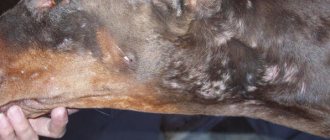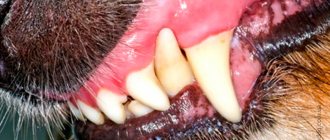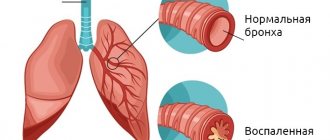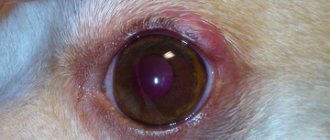Acute renal failure in dogs is a severe impairment of kidney function, as a result of which the normal outflow of urine is disrupted and intoxication occurs.
At the initial stage, the disease is detected very rarely, since there are practically no external signs, and disorders are noticeable only from the results of laboratory tests. To keep the animal safe, the dog owner must know the signs, symptoms and methods of preventing this disease.
What is this?
Acute renal failure is characterized by rapid development and manifestation of symptoms.
In dogs, this form of the disease is potentially curable, but only in cases where the diagnosis is made immediately and treatment is started quickly. Compensatory therapy can restore the dog’s kidney function to the maximum extent possible in a particular case.
The clinical picture in the acute form of the disease is very pronounced, the physical condition of the dog deteriorates quickly, the development time is from 2 days to 2-3 hours.
As a rule, the animal’s condition is complicated by the fact that the acute form of renal failure is rarely of a primary nature. Most often, this is an exacerbation of chronic pathology, which causes the main damage to the kidneys.
The surge arrester is divided into several types:
- Prerenal. As a rule, these are the consequences of a state of shock, as a result of which blood circulation in the kidneys was disrupted against the background of a sharp drop in blood pressure.
- Renal. Occurs as a result of infection and inflammatory processes in the kidneys. It may be caused by direct effects on the kidney tissue of certain drugs and substances.
- Postrenal. Most often, this type of acute renal failure is a consequence of urolithiasis. Occurs when the urinary tract is compressed or blocked.
Important! Renal dysfunction manifests itself acutely, but this form of the disease is less dangerous than chronic. An acute form of renal failure suffered by a dog leaves the possibility of complete restoration of kidney function.
Treatment of kidney failure
Treatment of acute renal failure and chronic renal failure in dogs is carried out with approximately the same drugs, with the only difference that in acute pathology it is important to first eliminate the influence of the provoking factor, and in a chronic course - to support the animal’s exhausted vitality.
Important: combinations and sequence of drug administration are determined exclusively by a veterinary specialist! Self-medication is strictly prohibited!
If an acute process is diagnosed early, the dog must be treated. Chronic renal failure is considered an incurable pathology, treatment procedures for which help put the body into a state of compensation, significantly prolonging the relatively normal life of the dog for a long time. In this case, most often, treatment and maintenance therapy for chronic renal failure will remain until the end of the pet’s life.
If the cause of renal failure is congenital underdevelopment or any genetic pathology, then it is impossible to completely restore the function of the kidney/kidneys. Only symptomatic therapy is provided.
- Intensive drip treatment of renal failure is prescribed, aimed at restoring not only water balance, but also electrolyte and acid-base balance. Also, through droppers, you can remove the maximum amount of toxic substances that the kidneys cannot deal with directly. It is important to administer the solutions warm so as not to aggravate the condition of a dog with a low body temperature.
- Drugs are prescribed that relieve gagging, improve blood counts, normalize biochemical levels in the blood, and eliminate anemia, which is a natural accompaniment of chronic renal failure.
- You may need careful antibiotic therapy for purulent lesions (the course and duration is determined by the final urine test).
- Urination is normalized with the help of diuretics and mechanical diversion of urine when the bladder is full (urine is removed using a catheter or surgery if there is a mechanical blockage).
- During the acute stage, blood and urine tests are regularly done to monitor the dynamics of the disease or recovery. Ideally, the dog should be left in a hospital during this period.
- Systemic glucocorticoid therapy to restore water balance and suppress immune responses in autoimmune glomerulonephritis.
- In cases of urgent need, drugs are administered that lower blood pressure (in the event of the development of renal hypertension - high blood pressure due to impaired kidney function) and normalize the passage of blood through the kidneys.
- There may be a need for drugs that protect the mucous membranes of the gastrointestinal tract and reduce overall acidity in the stomach.
- If the condition worsens, hemo- and peritoneal dialysis and plasmapheresis are possible.
- Tube feeding or parenteral nutrition may be possible if vomiting persists.
- Strictly monitor the level of phosphorus in the blood, using drugs that bind and remove its free fractions.
Causes
Factors that can lead to acute renal failure are divided into several main groups:
- Nephritis and nephrosis. Pyelonephritis is a common disease in dogs, which often provokes the destruction of kidney tissue and leads to disruption of their performance.
- Infections and parasitic diseases. Infectious diseases, in particular leptospirosis, which is often found in hunting and working dogs, seriously impair kidney function. Blood parasitic diseases have the same effect. The toxins released by parasites have a destructive effect on the dog's kidneys.
- Amyloidosis. This disease, often found in some dog breeds, is hereditary and leads to complete degeneration of the kidney tissue. This leads to the inability of the organ to perform its functions. This type of acute renal failure very often gives unfavorable prognosis, since amyloidosis is not treatable.
- Poisoning with toxic substances. In such cases, the kidneys are the first to suffer. The most severe consequences occur when the body is exposed to heavy metals. As a result of exposure, the kidneys cannot perform their functions, and acute renal failure occurs.
- Cysts. The prognosis in such situations is favorable, since after a properly performed operation, kidney function can be fully restored.
- Neoplasms. Tumors that interfere with kidney function can be either malignant or benign. Most often, this cause of acute renal failure occurs in adult dogs raised in large cities.
- Urolithiasis disease. In dogs, this cause of acute renal failure is not as common as in cats, but cases are still not uncommon.
Causes of kidney dysfunction in dogs
Pathological changes in the structure and functioning of the organs of the excretory system develop both in a short period of time and over several years. The difference in the timing of damage to the bean-shaped organs depends on the negative factors affecting the body.
The following have a negative effect on the kidneys:
- nephrosis, nephritis;
- cysts of various kinds;
- parasitic infections;
- unhealthy diet: cheap food, excess salt in the diet, hot sauces;
- poisoning with drugs, poisons, decay products of helminths during the treatment of helminthic infestations;
- long-term use of glucocorticosteroids, powerful antibiotics, NSAIDs;
- development of a tumor process: benign or malignant;
- pyelonephritis, pyometra in dogs;
- impaired urine excretion due to inflammatory diseases;
- sand and kidney stones;
- fatty tissue degeneration in severe obesity in dogs.
Is there a predisposition of breeds to damage to the excretory system? Veterinarians note: the incidence of chronic renal failure and acute renal failure is higher in Shar-Peis, Samoyeds, some types of shepherd dogs, cocker spaniels, and retrievers. This fact does not mean that other dogs do not have kidney problems, but the condition of the excretory system in representatives of the listed breeds should be under special control.
Where to buy a long-haired Chihuahua puppy, how to raise, maintain and train a pet? We have the answer!
The benefits of vitamin Excel 8 in 1 for dogs and the rules for using the bioactive supplement are written on this page.
Symptoms
Clinical symptoms of the disease in the acute form of acute renal failure always appear.
Main symptoms:
- Sharp depression of the dog’s physical condition. A dog that is cheerful and cheerful at the beginning of the day may become lethargic and apathetic in the evening.
- Urination becomes more frequent; at the initial stage of the disease, the owner of the animal may notice an increase in the volume of urine produced. With further development of the disease, this number decreases.
- Muscle weakness develops, and the dog reacts poorly to physical activity. The animal may try to get up, but it is difficult to do so; its paws are shaking.
- Appetite is noticeably reduced. The dog stops reacting even to his most favorite treats.
- The color of the mucous membranes changes. In some cases, excessive pallor can be noted, in others - sharp redness. The heart rate increases.
- Swelling of the paws, abdomen and sternum appears.
- Body temperature also changes. Depending on the cause of acute renal failure, it may increase or decrease.
- Small ulcers appear on the mucous membranes of the dog's mouth. Most formations occur along the edges of the animal's tongue.
- Rapid development of acute renal failure can lead to coma. The condition is characterized by rare, shallow breathing and the absence of any reactions.
Symptoms of an extremely serious condition of a dog are:
- The appearance of many ulcers on the mucous membranes.
- Loss of balance, seizures and severe trembling.
- Vomiting accompanied by foam from the mouth.
Important! If one or more obvious signs of illness occur, contact your veterinarian immediately. The life of the animal directly depends on how quickly the diagnosis is made and therapy is started.
Signs and symptoms
The main signs of an acute form of pathology:
- thirst increases;
- weakness, lethargy, loss of appetite;
- increased urination;
- ulcers and inflamed areas appear on the gums and tongue;
- muscles weaken;
- swelling appears;
- mucous membranes become paler or redden beyond measure;
- the heart rhythm is disturbed (tachycardia develops).
Symptoms of chronic kidney disease:
- thirst;
- dry mucous membranes in the mouth;
- development of bradycardia;
- decrease in body temperature;
- exhaustion; diarrhea;
- vomit;
- the appearance of an ammonia smell from the mouth.
On a note! The complex of negative manifestations depends on the stage and form of severe pathology. The danger of renal failure lies in the latent (hidden) course of the disease over a long period, which leads to a high percentage of dead nephrons.
Diagnostics
The diagnosis of acute renal failure is made by a veterinarian based on the general clinical picture and laboratory test results.
When diagnosing, the doctor carries out the following actions:
- examination of the animal;
- taking anamnesis;
- a general and biochemical blood test is prescribed;
- general urine analysis;
- ultrasound and x-ray examination of the abdominal cavity and kidneys;
- in some cases, a biopsy is required to clarify the diagnosis.
What will the tests show?
In case of acute renal failure, clinical trial data will show the following changes:
- an increase in the amount of protein in the urine;
- the presence of cylinders in the urinary sediment;
- increased urea content;
- increased creatinine levels;
- increased concentration of phosphorus and potassium.
Prevention of kidney disease in dogs
It is impossible to 100% prevent the development of kidney pathologies in dogs, because, unlike cats, there are many more causes that provoke this condition. The main emphasis is on annual medical examination (preventive examination by a veterinarian) for young dogs and every six months for old dogs. In this case, it is necessary to take blood and urine tests, as well as do an ultrasound of the abdominal organs. With this approach, it is possible to identify not only the very beginning of renal failure, which can still be cured, but also even determine a predisposition to it.
Also, an important preventive measure for dogs is timely vaccination and antiparasitic treatments, because In this type of animal, kidney pathologies can be provoked not only by infections, but also by parasites.
You should also ensure that your pet does not come into contact with any toxic or poisonous substances, including household chemicals.
Forecast and consequences
The dog’s ability to recover and restore kidney function depends on many factors. After acute renal failure, the most effective diagnostic method is a kidney function test (KFP).
In acute renal failure, the prognosis is favorable and kidney function can be restored even after complete inhibition of urinary function. However, this is only possible if time has not been lost. The death of an animal and serious consequences for its health can only be avoided if you immediately consult a doctor.
Chronic form
Advanced renal failure is most often diagnosed in dogs after 6 years of age. The true cause of chronic renal failure is most often discovered only after autopsy.
In young dogs, chronic renal failure develops due to:
- lack of treatment for acute forms of the disease;
- hereditary kidney diseases;
- chronic pathologies affecting kidney function.
When kidney cells die gradually, their function is taken over by the remaining healthy cells. That is why the first signs of the disease are visible only to a specialist. The fewer living cells remain, the more the symptoms increase, but at this time it is difficult to help the dog, since a large area of the kidneys is affected.
Symptoms of chronic renal failure:
- lethargy, apathy;
- the urge to urinate, but with a small amount of urine;
- severe thirst, the pet drinks a lot of water;
- signs of dehydration;
- pungent odor of urine from the mouth;
- low (less than 37 degrees) body temperature, bradycardia;
- vomit.
The problem is also indicated by the dog’s appearance: weight loss, dull fur, and increasing signs of anemia. The examination reveals high levels of creatinine and urea in the blood, the specific gravity of urine drops, there is a lot of protein and sugar in the urine, but, as with acute renal failure, no sediment is observed.
Treatment
The primary goal in treating acute renal failure in dogs is to eliminate the causative factor.
- Prescription of infusion therapy. Its goal is to replenish the water-salt balance and reduce the load on the kidneys . Intravenous administration of drugs allows you to speed up the cleansing of toxins from the body. The drugs used at this stage are physical. solution, Ringer's solution, Reogluman.
- Antiemetic drugs and sorbents are prescribed - Cerucal, Papaverine, Enterosgel, etc.
- To normalize the outflow of urine, the dog is prescribed diuretics. These are Furosemide, Mannitol, Lespenefril, etc. Sometimes surgery and installation of a urinary catheter are required.
- If bacterial infections , the doctor will prescribe antibiotics.
- If tests reveal an increased content of phosphorus , drugs are prescribed to remove it from the body - Almagel, Maalox, Aludrox.
- If anemia is detected, the animal is prescribed vitamin B12, Ferroglukin, Ursoferan.
- Against the background of acute renal failure, the cardiovascular system . To maintain it, Cordiamin, Riboxin, Cocarboxylase are prescribed.
In addition to drug treatment, acute renal failure often requires hemodialysis. This method allows you to quickly and effectively cleanse the blood of toxins.
Preventive actions
Prevention of renal failure consists in the prevention and timely treatment of primary pathologies. You need to feed your dog only high-quality food. The diet must be balanced according to all indicators, taking into account the age, gender, weight and physical condition of the animal. It is necessary to abandon cheap ready-made food, and make up the diet either independently from high-quality products, or use ready-made food on the recommendation of a veterinarian. It is especially important to change the diet of older animals.
The dog must be protected from infectious and invasive diseases. There is a vaccine against leptospirosis, and if it occurs, treatment with streptomycin and serum should be started immediately. Other diseases are protected by vaccines and parasite treatments.
Owners should protect the animal from contact with any toxic substances. Regular clinical examination and laboratory tests will help prevent metabolic problems. Treatment of renal failure in dogs must be complete and prompt, since this disease is accompanied by serious complications - seizures, coma, heart failure, pulmonary edema, intestinal bleeding. Recovery is slow - initial improvements occur after 3-6 weeks, and complete restoration of kidney function can take up to 4-8 months.
Feeding
During treatment for acute renal failure, it is very important to carefully monitor all vital functions of the dog, including nutrition.
The basic principle of the diet for acute renal failure is that food should not contain large amounts of phosphorus, calcium and protein.
Important! Feedings during the treatment of acute renal failure should be frequent and light. The dog must always have access to clean water.
Products that need to be excluded from the diet:
- vegetable oils;
- fish fat;
- eggs;
- bones and meat by-products;
- cheese.
All fatty foods are introduced gradually, increasing the dose to a normal level. The best source of protein for a dog undergoing treatment is raw tripe.
50% of the daily value should be carbohydrates - vegetables and cereals.
To reduce the level of phosphorus in a dog’s body, it is allowed to add ground egg shells to food in the amount of 1 teaspoon per 1 kg of food.
As a rule, doctors recommend switching the animal during treatment to special food recommended for animals with problems with the urinary system (Royal Canin Veterinary Diet Canine Renal).
What to feed a dog with such deficiency
One of the conditions for the treatment of acute renal failure and chronic renal failure, as well as your desire to prolong the life of your pet, is nutrition. A properly selected and balanced selection of products will enable your four-legged friend to live a full and joyful life again. To do this, again, you need to listen to the opinion and advice of a specialist. At the same time, you can prepare dishes for your pet yourself. You can also use special food for this purpose, buying it in specialized stores or veterinary pharmacies.
When choosing food for dogs with kidney failure, you must adhere to certain requirements. But the most important requirement when cooking is to strictly limit the use of salt. It is salt that is the main enemy for those suffering from kidney failure. And if the owner values his pet, he will carefully adhere to this rule.
But fats in food should be in sufficient quantities. They are necessary to restore your pet's vitality. Your dog's diet should include eggs, butter, and high-fat yogurt. But you should not use vegetable oil for cooking. When preparing dishes at home, you must remember that fats should be introduced gradually and in small portions so as not to upset the functioning of the stomach and intestines.
Protein foods cannot be completely excluded from the diet. But you still have to limit it. You can give your pet two whites and only one yolk. You can include eggshells in your diet. Just before serving, you need to chop it well. This use of shells will allow phosphorus to be absorbed. For half a kilogram of any cooked food, you only need one gram of crushed eggshells.
Consumption of dairy products
Milk and products containing milk and bones should be administered with some caution and in small quantities. The amount of foods that contain phosphorus directly depends on the severity of the disease. The more complex the degree of the disease, the less phosphorus should be in the animal’s diet.
Carbohydrates that have a low amount of phosphorus should also be used when feeding a dog suffering from kidney failure. You can prepare dishes using semolina and rice, as well as white potatoes.
Another very important factor in dietary nutrition is water. Tap water should never be used for cooking, especially for an animal suffering from kidney failure. Therefore, water is taken for culinary products and simply for drinking, only filtered.
If your pet does not want to eat, then it is better to prepare him the dishes that he likes. Pamper your pet with delicious dishes. As the dog recovers, it will eat whatever is offered to it.
There are special dry foods for dogs (more details) suffering from kidney diseases. And their range is quite diverse. But before you buy such food, you need to make sure whether it is suitable for your pet.
It is worth knowing that transferring a dog to a regular diet is possible only after certain treatment and tests, with the permission of a doctor. This is possible if your four-legged friend is diagnosed with acute renal failure. In case of chronic renal failure, dietary nutrition is constantly observed and cannot be abandoned. If in the old days older dogs suffered from kidney failure in dogs, now PN has become younger. And many younger pets suffer from this disease. Take care and love your pets.
Currently reading:
- Detection of endocardiosis and its treatment in dogs
- What to do if your dog has heart failure
- Thyroid dysfunction in dogs (hypothyroidism)
- Seven Signs and Remedies for Getting Rid of Fleas in Dogs
In pregnant women, lactating women and puppies
Acute renal failure occurs in pregnant dogs in the first half of gestation, and, as a rule, is provoked by infectious diseases or fetal development disorders.
This condition develops rapidly and poses a danger to the mother and future puppies. To treat the disease, complex therapy is carried out aimed at normalizing the functioning of the kidneys. When choosing medications, the doctor gives preference to those medications that have the least effect on the fetus.
Breastfeeding women may also develop acute renal failure as a result of infection during childbirth and blood loss. Timely measures taken in this case can also save the life and health of the dog.
Reasons for development
Of course, there is a certain connection between the development of the disease and the age of the dog: in animals over 7 years old it occurs 3 times more often than in young ones. The development of chronic renal failure is influenced by previous infectious diseases, such as leptospirosis, viral hepatitis, and canine distemper.
Severe poisoning also leads to the development of the disease, because Toxic substances are eliminated from the body through the kidneys.
The appearance of urolithiasis with blockage of the urinary tract, as well as the presence of tumors of various origins, leads to a complication in the form of chronic renal failure.
Traumatic damage to the body with large blood loss and a sharp drop in blood pressure.
Mycoplasmas, which are the causative agents of piroplasmosis, cause profound structural changes in cells.
Another factor in the occurrence of the disease is genetically determined abnormalities in kidney development. In this case, the functional failure is inherent from birth and slowly develops under the influence of external factors.











